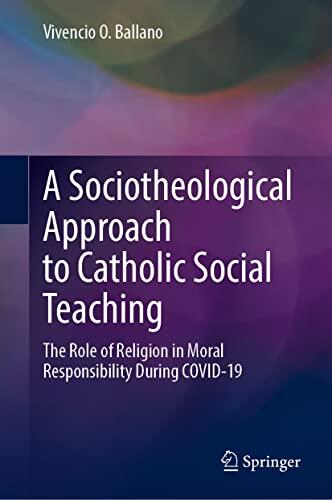
A Sociotheological Approach to Catholic Social Teaching: The Role of Religion in Moral Responsibility During COVID-19
还没有评分
Thriller & Suspense
Action & Adventure
Religion & Spirituality
+2
more
格式
Kindle
页数
329
语言
中文
已发布
Jan 1, 2022
出版商
Springer
ISBN-10
9811970750
ISBN-13
9789811970757
描述
In times of crisis, the intersection of faith and social responsibility becomes strikingly evident, particularly during the global pandemic COVID-19. The author delves into the complexities of Catholic social teaching, exploring how religious beliefs shape moral guidelines and influence ethical decision-making. By analyzing the sociotheological implications of public health responses, the narrative uncovers the pivotal role that religion plays in fostering moral accountability within communities facing unprecedented challenges.
Vivencio O. Ballano weaves together theology and social theory, offering insights into how faith can act as a catalyst for collective action and solidarity. The book examines key theological principles that inform the Catholic response to social issues, emphasizing the importance of compassion and justice in navigating the moral dilemmas presented by the pandemic.
Through a careful study of case examples and theological reflections, the work highlights the enduring relevance of Catholic teachings in promoting ethical behavior during crises. Readers are encouraged to reflect on their own moral responsibilities, fostering a deeper understanding of how faith can guide actions in the face of adversity.
Overall, this exploration provides a thought-provoking perspective on the integration of religion and social ethics, urging individuals and communities to consider the broader implications of their beliefs in the pursuit of the common good amidst turbulent times.
Vivencio O. Ballano weaves together theology and social theory, offering insights into how faith can act as a catalyst for collective action and solidarity. The book examines key theological principles that inform the Catholic response to social issues, emphasizing the importance of compassion and justice in navigating the moral dilemmas presented by the pandemic.
Through a careful study of case examples and theological reflections, the work highlights the enduring relevance of Catholic teachings in promoting ethical behavior during crises. Readers are encouraged to reflect on their own moral responsibilities, fostering a deeper understanding of how faith can guide actions in the face of adversity.
Overall, this exploration provides a thought-provoking perspective on the integration of religion and social ethics, urging individuals and communities to consider the broader implications of their beliefs in the pursuit of the common good amidst turbulent times.